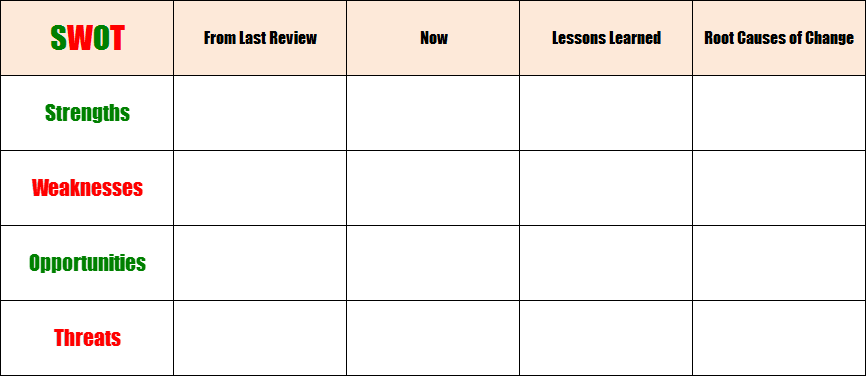Recently, I created the following [SWOT-grounded] table to help organize thoughts for a mid-year Strategic Planning session.
This 'SWOT activity' brought back fond memories of time spent with Don Peart...as captured below, in the Fall of 2013 Don Peart introduced our CFFB roundtable group to his broader perspective on SWOT. Don's message was an exceptional improvement on SWOT. Don's recommendations meshed perfectly with Talents & Strengths thinking and with solutions-focused thinking...i.e., thinking progressive business leaders need to embrace. Ever since that morning with Don, every time I think of SWOT I review his messages and how they can help individuals put their Talents to good use and do their work with a positive, solution-aimed attitude.
I work at creating simple tools to help expand the use of SWOT. For example, the following simple table helps focus thinking and discussion on S & W & O & T while also considering what has changed since the last strategy session.
Of most importance:
- What lessons have we learned from the changes? and
- Why did those changes happen?

The following was first published October 28, 2013
STRENGTHS: The Gallup people presented Strengths as a combination of Talent, Knowledge, & Skills. Talent is not enough on its own. It must be coupled with Knowledge. We clarify that the Knowledge must be specialized, focused, and consistent with what it takes to achieve goals. Talent coupled with Knowledge is not enough...it is essential that Skills be practised until tasks and processes are mastered. Only then can one possess and vent Strengths. On top of that Gallup wisdom, we added Opportunities. That's where leaders fit in. Leaders recognize Talent, provide access to Knowledge and training & development in the form of practising. In this way, leaders provide the Opportunities for the development of Strengths.
P=2S+O: Bosses exist to delegate tasks and processes and manage the people who do those tasks and processes. That being the framework for business, bosses really don't want to hear Problems. Bosses only want to hear Problems when the Problems are used to introduce Solutions...and, every once in a while, Opportunities. That's the P=2S+O philosophy. That's why we created the P=2S+O tool.
SWOT is a strategic planning tool developed a couple of generations ago. It can be used to sort thoughts about business processes & business situations. And, as was recently brought to our attention by Don Peart, SWOT can be used to sort thoughts about people.
Business Contains Only 3 Things: People, Process, & Situations.
The thinking around SWOT's application for business Processes & Situations is on the record. Just Google 'SWOT' and you will find much theory and practical advice.
The first 3 thoughts that came to me when Don Peart talked about applying SWOT thinking to People were:
1. There's a lot of common ground shared by SWOT and our definition of personal Strength.
2. P=2S+O is a practical tool, designed to cause people to focus on Solutions while keeping their minds and eyes open for Opportunities.
3. When recruiting we could use SWOT thinking as an umbrella over our definition of Strengths and our P=2S+O philosophy.
Here's the picture...
